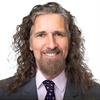Michael Finds "Keyhole" Disk Procedure
His Key to an Active Future

Rogers Park resident Michael L. is an optimist by nature. Living an active lifestyle has always been a priority for him, and before two accidents several years ago he assumed he would enjoy his favorite activities for the rest of his life.
Michael began to experience debilitating back pain that steadily grew more severe over time. He coped with the limitations for a period, but he realized he need to seek help when further injury he incurred while moving into a new apartment resulted in constant pain when lifting anything, climbing stairs or even getting out of bed.
“I had an extremely poor quality of life,” said Michael. “I was eventually forced to pull myself up by my arms whenever I rose to avoid causing severe pain in my legs due to my back. It was a very humbling experience.”
Michael was referred to
Daniel Laich, D.O., a neurological surgeon in the
Chicago Brain & Spine Institute, for treatment to relieve the pain. Having worked as a nurse in a hospital for years, Michael knew that back surgery could be an ordeal, and he was initially hesitant regarding the possibility of undergoing a spinal procedure.
Michael had known Dr. Laich before the referral, having met the surgeon when he was an intern many years prior. Through their history as health care professionals, Michael had been impressed with Dr. Laich’s ongoing professionalism and his unwavering quest for the most advanced, beneficial treatments. During their initial meeting as doctor and patient, Dr. Laich listened to Michael’s concerns, putting him at ease before they worked together to develop a personalized treatment plan.
“Back problems are often recurrent,” said Dr. Laich. “When something happens and the problem gets worse, people are no longer able to do the things that are important to them, so they seek treatment.”
For Dr. Laich, the process of determining treatment follows a threefold approach: “First, we try to avoid surgery if we can. Second, we try to get the patient to make changes and do physical rehabilitation. And third, we listen to our patients’ explanations of their condition, and don’t just operate based on the radiographic images. We take their symptoms and pain into account, and by doing so, we can perform the most minimally invasive procedure that will help patients get back to living their lives sooner.”
In Michael’s case, Dr. Laich completed an endoscopic version of a traditional microdiscectomy, the most minimally invasive way to decompress the nerves of the spine, whether caused by stenosis, disk herniation or a disk bulge. Michael experienced relief almost immediately following the surgery and was pleasantly surprised that he was able to go home that same day.
Dr. Laich was the first American surgeon trained to perform the endoscopic, or “keyhole,” technique. The specialized procedure avoids the muscles surrounding the spine, concentrates solely on the damaged part of the disk, whereas traditional surgeries can damage those muscles and cause further discomfort.
“Like Michael, many of our patients experience less pain and scarring, a shortened hospital stay (many patients go home the day of surgery), reduced risk of infection, faster overall recoveries and less risk of needing follow-up surgeries,” Dr. Laich says. “We are thrilled to see our patients regain mobility, say goodbye to their pain, get back to an active lifestyle and essentially their lives.”
“I couldn’t believe that there was no pain in my legs following the procedure,” Michael says. “I initially thought that the relief was due to the medication, but thankfully the pain still hasn’t returned. Now that I’m pain free and mobile, I’m able to enjoy a much improved quality of life, and hope to soon take classes to become a nurse practitioner and return to work.”
 Daniel Laich, D.O.
Daniel Laich, D.O., is a board-certified internal medicine physician and neurological surgeon with Endeavor Health Medical Group with nearly 25 years of experience. He specializes in therapeutic and minimally invasive spine treatments, including endoscopic and arthroplasty surgeries, as well as spine reconstruction. He was a fellow when he started a study on the Charite artificial disk, and with Rick Fessler, M.D., Ph.D., as he pioneered minimally invasive spine surgery.
To schedule an appointment with the Chicago Brain & Spine Institute, please call
773-271-2225.
By Bill Ligas | Published March 18, 2016

